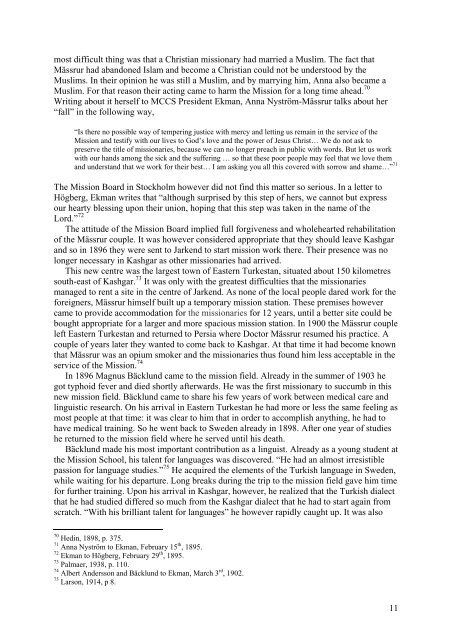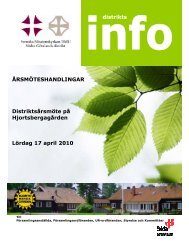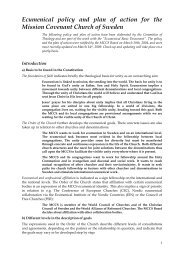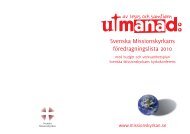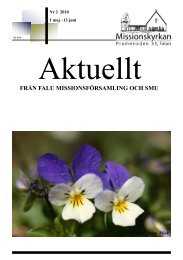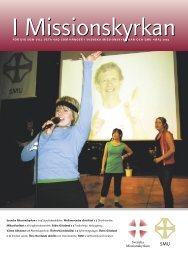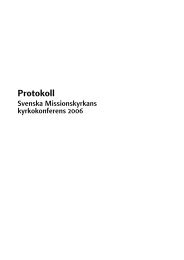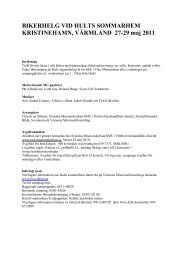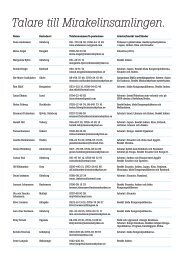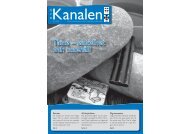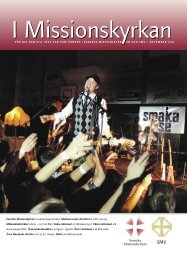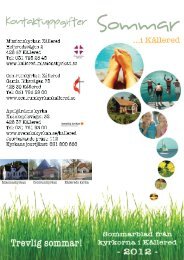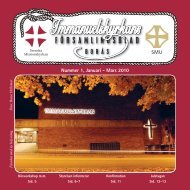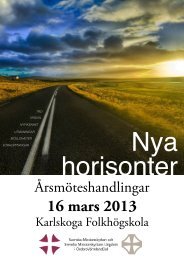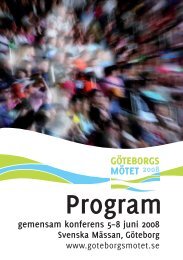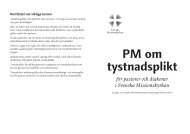Mission and Revolution in Central Asia - Svenska Missionskyrkan
Mission and Revolution in Central Asia - Svenska Missionskyrkan
Mission and Revolution in Central Asia - Svenska Missionskyrkan
Create successful ePaper yourself
Turn your PDF publications into a flip-book with our unique Google optimized e-Paper software.
most difficult th<strong>in</strong>g was that a Christian missionary had married a Muslim. The fact that<br />
Mässrur had ab<strong>and</strong>oned Islam <strong>and</strong> become a Christian could not be understood by the<br />
Muslims. In their op<strong>in</strong>ion he was still a Muslim, <strong>and</strong> by marry<strong>in</strong>g him, Anna also became a<br />
Muslim. For that reason their act<strong>in</strong>g came to harm the <strong>Mission</strong> for a long time ahead. 70<br />
Writ<strong>in</strong>g about it herself to MCCS President Ekman, Anna Nyström-Mässrur talks about her<br />
“fall” <strong>in</strong> the follow<strong>in</strong>g way,<br />
“Is there no possible way of temper<strong>in</strong>g justice with mercy <strong>and</strong> lett<strong>in</strong>g us rema<strong>in</strong> <strong>in</strong> the service of the<br />
<strong>Mission</strong> <strong>and</strong> testify with our lives to God’s love <strong>and</strong> the power of Jesus Christ… We do not ask to<br />
preserve the title of missionaries, because we can no longer preach <strong>in</strong> public with words. But let us work<br />
with our h<strong>and</strong>s among the sick <strong>and</strong> the suffer<strong>in</strong>g … so that these poor people may feel that we love them<br />
<strong>and</strong> underst<strong>and</strong> that we work for their best… I am ask<strong>in</strong>g you all this covered with sorrow <strong>and</strong> shame…” 71<br />
The <strong>Mission</strong> Board <strong>in</strong> Stockholm however did not f<strong>in</strong>d this matter so serious. In a letter to<br />
Högberg, Ekman writes that “although surprised by this step of hers, we cannot but express<br />
our hearty bless<strong>in</strong>g upon their union, hop<strong>in</strong>g that this step was taken <strong>in</strong> the name of the<br />
Lord.” 72<br />
The attitude of the <strong>Mission</strong> Board implied full forgiveness <strong>and</strong> wholehearted rehabilitation<br />
of the Mässrur couple. It was however considered appropriate that they should leave Kashgar<br />
<strong>and</strong> so <strong>in</strong> 1896 they were sent to Jarkend to start mission work there. Their presence was no<br />
longer necessary <strong>in</strong> Kashgar as other missionaries had arrived.<br />
This new centre was the largest town of Eastern Turkestan, situated about 150 kilometres<br />
south-east of Kashgar. 73 It was only with the greatest difficulties that the missionaries<br />
managed to rent a site <strong>in</strong> the centre of Jarkend. As none of the local people dared work for the<br />
foreigners, Mässrur himself built up a temporary mission station. These premises however<br />
came to provide accommodation for the missionaries for 12 years, until a better site could be<br />
bought appropriate for a larger <strong>and</strong> more spacious mission station. In 1900 the Mässrur couple<br />
left Eastern Turkestan <strong>and</strong> returned to Persia where Doctor Mässrur resumed his practice. A<br />
couple of years later they wanted to come back to Kashgar. At that time it had become known<br />
that Mässrur was an opium smoker <strong>and</strong> the missionaries thus found him less acceptable <strong>in</strong> the<br />
service of the <strong>Mission</strong>. 74<br />
In 1896 Magnus Bäcklund came to the mission field. Already <strong>in</strong> the summer of 1903 he<br />
got typhoid fever <strong>and</strong> died shortly afterwards. He was the first missionary to succumb <strong>in</strong> this<br />
new mission field. Bäcklund came to share his few years of work between medical care <strong>and</strong><br />
l<strong>in</strong>guistic research. On his arrival <strong>in</strong> Eastern Turkestan he had more or less the same feel<strong>in</strong>g as<br />
most people at that time: it was clear to him that <strong>in</strong> order to accomplish anyth<strong>in</strong>g, he had to<br />
have medical tra<strong>in</strong><strong>in</strong>g. So he went back to Sweden already <strong>in</strong> 1898. After one year of studies<br />
he returned to the mission field where he served until his death.<br />
Bäcklund made his most important contribution as a l<strong>in</strong>guist. Already as a young student at<br />
the <strong>Mission</strong> School, his talent for languages was discovered. “He had an almost irresistible<br />
passion for language studies.” 75 He acquired the elements of the Turkish language <strong>in</strong> Sweden,<br />
while wait<strong>in</strong>g for his departure. Long breaks dur<strong>in</strong>g the trip to the mission field gave him time<br />
for further tra<strong>in</strong><strong>in</strong>g. Upon his arrival <strong>in</strong> Kashgar, however, he realized that the Turkish dialect<br />
that he had studied differed so much from the Kashgar dialect that he had to start aga<strong>in</strong> from<br />
scratch. “With his brilliant talent for languages” he however rapidly caught up. It was also<br />
70<br />
Hed<strong>in</strong>, 1898, p. 375.<br />
71 th<br />
Anna Nyström to Ekman, February 15 , 1895.<br />
72 th<br />
Ekman to Högberg, February 29 , 1895.<br />
73<br />
Palmaer, 1938, p. 110.<br />
74 rd<br />
Albert Andersson <strong>and</strong> Bäcklund to Ekman, March 3 , 1902.<br />
75<br />
Larson, 1914, p 8.<br />
11


